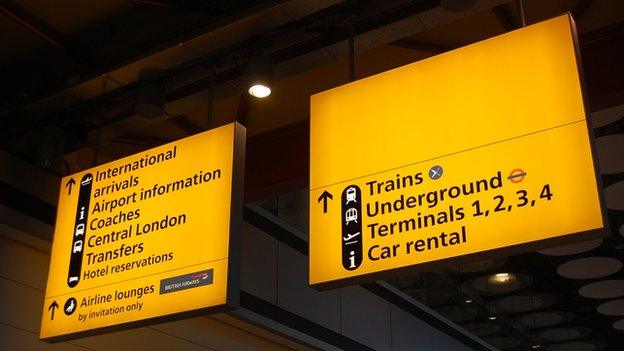Immigration question still open
- Published
- comments

The new report on the tax and spending impact of migration to the UK by Dustmann and Frattini probably settles one part of the immigration controversy. But the biggest questions remain open.
They have shown that the new migrants from Eastern Europe, the ones that are seen as largely responsible for the rise and rise of UKIP and the shaking up of the party-political status quo, have been net contributors to the public purse - after allowing for taxes, tax credits, benefits and use of public services (and see my earlier note on this).
In a way that is not surprising. We have all seen - or certainly if we live in London and other major cities we have - how thousands and thousands of young Eastern Europeans, often with university degrees, have come here to work hard.
They are at that stage of their working lives, like indigenous young people, who are bound to contribute more to the state than they take out.
So what Dustmann and Frattini have exploded is the idea that the majority of them are benefit and public-service tourists, people who come to Britain to leach off the Exchequer, and our hospitals and schools.
Some may be. Most are not.
But as Migration Watch points out, Dustmann and Frattini have also shown that, over the longer term, immigrants to the UK have been a burden on the state.
They estimate that between 1995 and 2011, all immigrants to the UK - from outside the European Union and inside - were a net drain on public resources of between £114bn and £31bn, depending on whether a proportionate share of all public spending is allocated to them, or only a share of the public services whose costs increase as the population rises.
Strikingly Dustmann and Frattini show that all the net costs are generated by emigres from outside the European Union.
Again that is not surprising. The longer that immigrants stay in Britain, the more British they become, as it were. And the painful fiscal fact is that so-called native British people were a burden on the state over the same assessed period of between £591bn and £674bn.
There is an important lifecycle point here.
As most of us move from our 20s and into our 30s and become older still, for a period most of us become more productive, increasing our net contributions to the Exchequer.
But as we have children, we take more out from schools and the health service - until we retire or become infirm, at which point it is very hard for us not to be a net burden on the state.
So there are two big questions about the recent immigrants from Eastern Europe - one empirical or factual, the other cultural and social.
The empirical question is whether the Eastern European emigres will stay here or return home at the point they become a burden.
Is there anyone out there, apart from wannabe Merlins, who can answer that?
But of course there is a much bigger question, which is to do with all our happiness and what's often called social cohesion. Is a rapidly changing population mix and a population that is growing something we like and relish, or something we find unsettling or worse?
And the great thing about our democracy is that we will have an opportunity to vote on that, and other stuff presumably, in just a few short months.
There is another thing.
A truism of standard economics is that a growing population is good for economic growth.
But a growing population can also be associated - and seems to have been in the US and to an extent the UK in recent years - with a widening in the gap between rich and poor: the rich frequently reap most of the benefits of cheap migrant labour, while those on lowest wages in the indigenous population have their pay squeezed.
So it is important to recognise that although migration will be good for the prosperity of many, perhaps the majority, it can never be good for the prosperity of all.